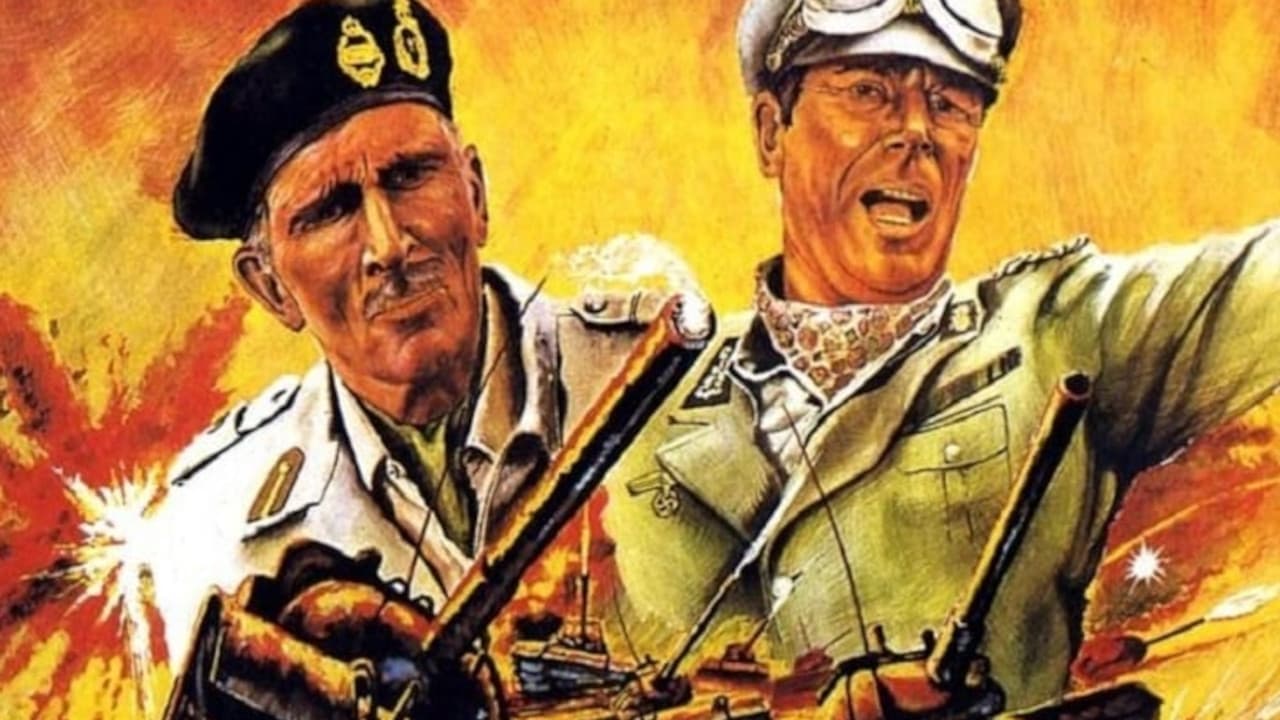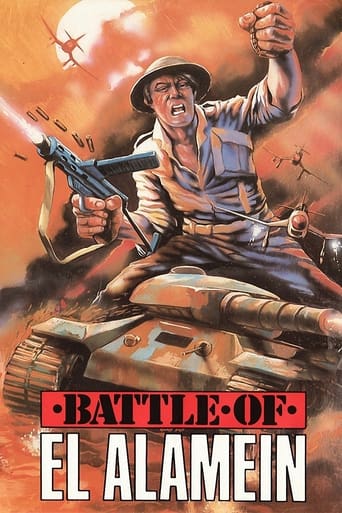

An absolute waste of money
... View MoreIt's a mild crowd pleaser for people who are exhausted by blockbusters.
... View MoreA lot of perfectly good film show their cards early, establish a unique premise and let the audience explore a topic at a leisurely pace, without much in terms of surprise. this film is not one of those films.
... View MoreIt is an exhilarating, distressing, funny and profound film, with one of the more memorable film scores in years,
... View More'El Alamein' is a WW 2 movie, sensationalist and exploitative, unassuming and episodic; British, Germans and Italians fight unsparingly in the African desert, and we recognize the dunes, the hills of gray sand, from the westerns of the '60s, the envy and intrigues cause the temporary removal of Rommel, meanwhile the Germans loose most of their tanks due to the British's perfidy but also abnegation and determination, Rommel is sent back, only to assure the retreat, against the leader's order . We will also think about the difference between a movie as a popular show, and a movie as a work.We look at war from the headquarters, and from an Italian stronghold. The main ideas are toughness and courage, both amply provided by all the military involved; 'El Alamein' also shows strategies, the British duping the Germans with a phony map of the minefield, the Germans using the Italians to back their retreat. Characteristically, the movie isn't good-natured, but amoral, indifferent to ethics, which makes the plot plausible; the credits boast the support, and possible the approval of the Italian army. The protagonist is lieutenant Giorgio, from one of Folgere division's companies; goodish cast (Hilton, M. Rennie, Ira Furstenberg, Hossein, Salerno). The known commanders, Rommel, Montgomery, Canaris, have supporting roles or cameos. Rommel's military genius is undermined by intrigue and the leader's insanity.The battle scenes seem a bit shapeless (except those of the heroic resistance of the company against the British tanks, while the Germans retreat), as the real aim of the movie are some generic effects: like hell-raising, etc.. This is the main idea of a popular show: not as a work, but as providing a set of generic emotions. It doesn't need a director, but a hack.I enjoyed 'El Alamein'. Loosely structured, accomplished for what it was meant to be, cynical, rhetorical, episodic, sometimes with the sense of hopelessness and despair known from the Italian genre movies, and also the familiar sloppiness, it doesn't relish in filming landscapes, or people. In an American war movie, there's the effect on the audience, and also the scene as thought in itself, as depiction, as insight, as shaped; the Italian genre movies seem to undercut this idea of a scene, right to the effects themselves. So they care less about shape, about work, and more about the popular show. Even very humble American genre movies have this objective structure, this dramatic shape, which the Italian movies don't care for. 'El Alamein' has a plot, but not a dramatic storyline; the Italians didn't rip off a structure, but some topics. Further, the American genre movies also resort to an essentially English lyricism, which is wholly alien to the Italians. The Italian rhetoric may be sentimentalist, but dry, without lyrical depth.(This is a typology; these are ideal types. The European genre movies aren't the only to belong to the 'Judy and Punch' type; not all of them belong to it. Once acknowledged this _ideality of the types, the national criterion will lead one to a further understanding: e. g., the Italian genre movies lack a dramatic structure, but have charm, appeal, zest.)
... View MoreThe Battle for El Alamein is a cut above the other Italian WWII movies I've seen. It does have it's flaws though. Poor editing - as our heroic Italian warriors are being overrun by the Brits, everyone is getting ready to die. One guy tenderly caresses a photo of his son and laments that his son will never get to see his father. BOOM BOOM BOOM of explosions and cut to Montgomery casually leaning on on an armored personnel carrier. Only to come back later and find out that they weren't wiped out. What Happened?! There are other annoying cuts but that was the worst.The APCs are indeed M113s but the British did have something called the universal carrier which looks like an open top, cut down version of a 113. I'm willing to give that a pass.At one point we are in the British camp and they have real Sherman tanks, long barreled ones but they are Shermans. The Germans have M48s, I think they are. Both sides are painted tan. But in the final battle we have a line of M48s lined up on the ridge. It wasn't until the Italians said they were being attacked that I realized these were supposed to be British tanks. Most confusing.At any rate, this movie is a cut above the usual Italian war movie and is good enough for a watch. It's something different in that the roles are reversed and the Italians are the heroes and good soldiers and the allies are the faceless mob getting mowed down by the ton. Not that that is a good thing but it's a change of pace.
... View MoreOK I know, it's a cheesy flick with a low budget, but I really enjoyed it. The Italian tanks coming into the battle was awesome! I always play this game called Panzer General and my favorite moves are trying to amass Italian troops against the Allies just to test my ability. I'm glad the Italians were run by very VERY incompetent Officers because they could have been a real asset (more so) to the Germans. This is the story of an elite Italian Infantry unit (the Bersaglieri). In all, six of the 12 total Bersaglieri regiments fought in North Africa, compiling an excellent combat record. More than once, Bersaglieri units fought to the last man to hold a position while German units ran away. This movie tells of one of those engagements, and the first time I saw it and what armament they had to face a dozen tanks, I was really entertained and so will you! Try to get a decent print though because I was so desperate to see this one time that I bought it on tape and it was horrible, the DVD was really bad but at least it was watchable. It's the only one of it's kind that I've seen although I loved movies like Stalingrad (the BW version) that showed some of the Romanian army's in action. Interesting for war film buffs and recommended.
... View MoreUsually Italian films of the 60's, 70's, and 80's are considered sub par products primarily made for export to foreign markets. In many cases the WWII film followed the same formula. Take the plot of The Dirty Dozen, recycle it, add a trampoline and you have an entirely new and exportable film! (Yes, this is a dig at Cinque per l'inferno aka Five for Hell)La Battaglia di El Alamein struck me as different in that it focuses on the Italian army rather than German or American as usual for Italian war cinema of the time. The movie shows the Italian forces in a patriotic light. Some may balk at this portrayal as the Italian forces are generally characterized historically as inefficient units dogged by low morale. The movie has a generality of historical accuracy, embellished for cinematic reasons. The British are characterized as cold unfeeling soldiers, no worse than American directors portray Axis forces, though. Perhaps Battle of El Alamein portrays the Italian as a little too brave and heroic but this is the same heavy-handed treatment heroes in American films were given up until recently. The film stands out as an Italian production made for Italy's own populace. In this light any shortcomings can be overlooked. Yes, even miniature remote controlled model tanks that rumble across the desert can be overlooked. An Italian production heads and shoulders above many b-grade counterparts of this time period.
... View More